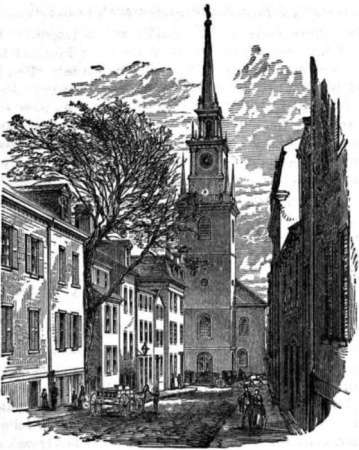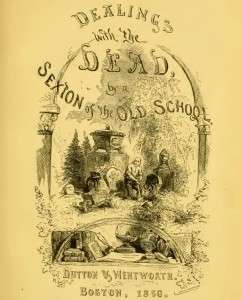New England’s early colonists paid a great deal of attention to death and funerals. Many people attended colonial funerals, and would think it strange for a town’s resident not to pay respect to an upstanding citizen by attending a funeral.
Many of today’s traditions, such as giving right of way to a funeral procession, stem from the earliest days of America. Other traditions from colonial funerals have died out or changed over time.
Here are seven strange practices of colonial funerals that faded away:
2 sets of pall bearers, sometimes 3
Early colonists carried the body of the deceased all the way from the funeral service to the graveyard. The older, more respected members of the community often found that a long way to carry a heavy coffin.
So two sets of men got pallbearer duty. The younger men of the community would be assigned as under bearers to carry the bier on which the coffin rested. Older men would carry the pall, which draped the casket. In cases where the graveyard was a long way off, a second set of under bearers spelled the first group.
Occasionally, the men set down the bier on a slab to rest.
Gloves, Routine Parts of Colonial Funerals
Families sent mourning gloves to people expected to attend the funeral of a departed loved one. Mourners wore the gloves during the funeral and at the graveside.
They were fashionable, respectful and, for ministers at least, plentiful. Andrew Eliot, ordained pastor of Boston’s North Church in 1742, kept a careful diary of his life. In his 32 years as a minister, he received 2,940 pairs of funeral gloves.
What did he do with them? He sold them, at least as many as he could. His diary shows a steady effort to divest himself of the gloves over the years.

Old North Church
Rings Were the Thing
The families of the deceased often created commemorative rings for their loved ones. They would be distributed to families, close friends and ministers. The rings represented a steady stream of business for goldsmiths and silversmiths.
The rings frequently had inscriptions with sayings, such as: ‘Death Parts United Hearts,’ or ‘Death Conquers All’ or ‘Prepare for Death.’ Because of the expense, mourning rings were more common at the colonial funerals of the wealthy.
The minister Andrew Eliot, in addition to collecting gloves, also had a massive ring collection. He stored it in a tankard.
Families often cherished the rings and handed them down from one generation to the next. The colonists didn’t view them as maudlin, but rather cheerful reminders of their reunion with their dead family in the afterlife.
No Sermons
While many townspeople attended colonial funerals, the services were virtually silent affairs. The earliest colonists, wishing to avoid any appearance of papistry, conducted minimalist funerals that no one could confuse with the Catholic ceremonies.
Sermons and eulogies were non-existent. Instead, the pallbearers would silently conduct the body to the graveyard. Mourners attached notes of praise for the deceased to the bier, which would be compiled and published as memorials to the deceased.
Bostonian Thomas Lechford (1590-1644) offered a description of colonial funerals in his notebooks:
At Burials nothing is read, nor any funeral sermon made, but all the neighborhood or a goodly company of them come together by tolling of the bell, and carry the dead solemnly to his grave, and then stand by him while he is buried. The ministers are most commonly present.
At funerals for major civic leaders, a minister would say a few words at the grave about the man’s character. For the most part, however, interment was a silent affair. This custom began dying out in the early 1700s, however. Popular sentiment began to build behind the idea that the dearly departed should have a few well-chosen words said over his grave.
Sober Affairs, Funerals Were Not
Early New Englanders used colonial funerals as a great excuse to tie one on.
Lucius Manlius Sargent, in his collection Dealings with the Dead, noted that in early colonial funerals guests viewed the body and then proceeded to a nearby table – always provided. They could then choose liquor from a well-stocked bar.
Mourners then generally went outside and to chat until it was time to carry the coffin to the burial ground. Though rarely did colonial funerals cause drunkenness, the idea of not serving liquor would have shocked. And the bar tab could grow quite large.
The following listing represents the funeral expenses for David Porter of Hartford, who drowned in 1678. The biggest outlay: booze.
A pint of liquor for those who dived for him. – 1 shilling
A quart of liquor for those who brought him home. – 2 shillings
Two quarts of wine & 1 gallon of cider to jury of inquest. — 5 shillings
8 gallons & 3 quarts wine for funeral. – £1, 15 shillings
Barrel cider for funeral. –16 shillings
1 Coffin. –12 shillings
Winding sheet. — 18 shillings
Sargent noted the practice of serving alcohol at funerals finally petered out, saddening a great many of the older citizens.
Mourning Got Out of Hand
As the colony grew wealthier, more and more mourners received rings, scarves and gloves. The wealth or popularity of the deceased was highlighted by the number of gifts distributed or the length of the funeral bell ringing.
The showiness and expense offended Puritan leaders, and several efforts limited the practices. In 1741, the Massachusetts government decided to fine a person 50 pounds for distributing wine or rum or funeral rings. The colony also restricted gloves to pall bearers and the clergy.
In Salem, the government hoped to curb excessive bell ringing and grandiose funerals by limiting what undertakers could charge for bell-ringing. Officials also limited the number of times a bell could be rung, as well as the overall cost of organizing the funeral.
Objects, Even Houses, Were Draped
People didn’t only decorate themselves colonial funerals. In some places, they decorated objects with black crape.
In Hartford, black cloth covered all wall decorations, mirrors and pictures. Mourners closed window shutters and sometimes tied them together with black ribbon or a sash. They kept it that way for a year-long mourning period.
Following the death of Sir William Pepperell of Kittery, mourners draped his entire house.
Again, the prominence of the deceased generally dictated the size of the colonial funeral show and the quantity of black bunting used.
If you enjoyed reading this story, you may also want to read about epitaphs in New England graveyards here.
Hat tip to Customs and Fashions in Old New England by Alice Morse Earle. This story about colonial funerals was updated in 2021.


7 comments
Very interesting
[…] the years passed, the practices became increasingly ostentatious and colony leaders sought to limit the expense and ostentation by levying a 50-pound fine for anyone found distributing wine or rum and funeral […]
[…] Many of today’s traditions, such as giving right of way to a funeral procession, stem from the earliest days of America. Other traditions from Colonial Funerals have died away or been altered over time. Here are seven strange funeral practices that have been done away with in modern times. Click for more. […]
[…] gloves and memorial gold rings as a tribute to the dead. According to research published by the New England Historical Society, Andrew Eliot, a minister at Boston’s North Church, amassed 2,940 pairs of funeral gloves over […]
[…] the New England Historical Society notes, funerals represented a collecting opportunity for attendees, who cherished the items and often […]
[…] needed to be decorated, the bees informed and given a bit of cake (they also had to be informed of funerals). Failure to include the bees was considered rude, and they might take […]
[…] Funeral Source The Funeral Practices of the Pilgrims and the Puritans Funeral Wise Seven Strange Facts About Colonial Funerals Deaths and Funerals in Colonial America Funerals in Eighteenth Century Virginia History of American […]
Comments are closed.